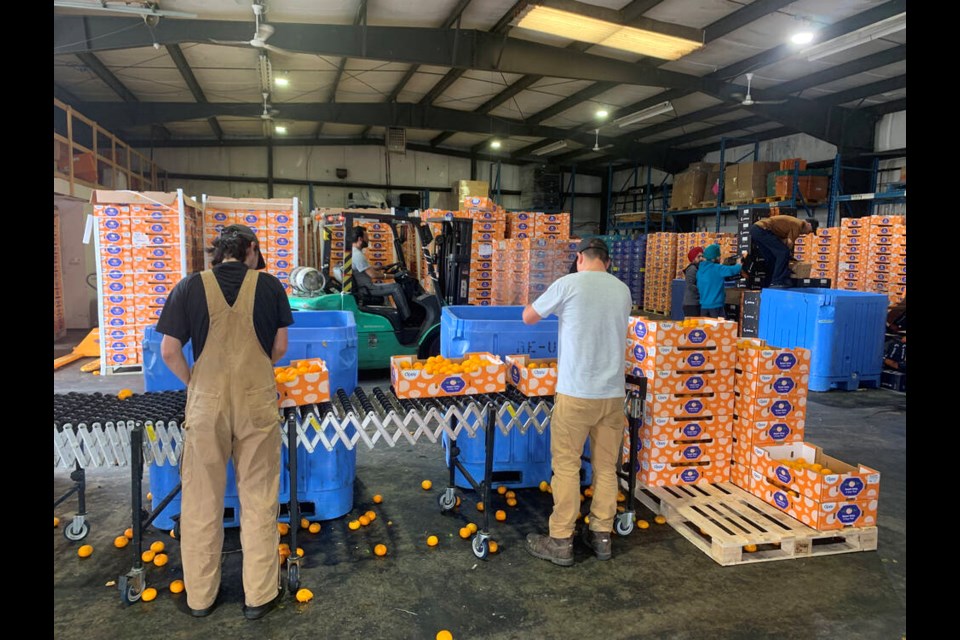If you were outraged by a mountain of mandarin oranges dumped in North Vancouver, there’s something you should know: it’s not a new issue.
The fact that so much of this imported fruit ends up rotting in B.C. dumps and landfills is something that Stuart Lilley has been trying to raise awareness about for years now.
Lilley is the founder and CEO of ReFeed Farms, an organization that takes food that’s unused by retailers and processes it for distribution to foodbanks, as livestock feed, or for repurposing into fertilizers or soil enhancers.
In August, ReFeed recovered a whopping 680 tonnes of mandarins due to the port workers strike, Lilley said. Product had arrived at the port, but no one could offload it. “Now all of a sudden, you’ve got a backlog of oranges or mandarins that have missed their delivery dates,” he said.
While that’s a huge amount of potentially wasted food, Lilley estimates that around 10 per cent of mandarin orange imports are culled each year. On the conservative end, that amounts to at least 10 tonnes per day going to waste from September to December in the province.
“Mandarin season,” as Lilley calls it, is something he’s witnessed in the industry for more than a decade. A number of factors make the citrus fruit particularly susceptible to getting tossed.
Thinner skins, versus a traditional orange, make mandarins more prone to degradation during transport, Lilley said.
“There’s going to be loads that would actually get rejected if there is degradation within them,” he said, adding that any mouldy or liquefied product within a load can also lead to the entire thing being rejected.
A lot of non-organic oranges are hit with a special gas to get them to ripen. “And so that gas and can actually create problems on the skin through colourization, through blemishes, and those will get rejected as well,” Lilley said.
Because mandarins are expected by consumers during the holiday season, the demand is always there. “So there is always an overproduction,” he said. “They also factor in that cullage that you’re seeing. Typically that’s around 10 per cent, but in a given year it could be better, or it could be worse,” Lilley added.
Regulation should require producers to use food recovery, ReFeed founder says
Lilley, who’s originally from Lynn Valley in North Vancouver, started a company called Waste Collective around 14 years ago, to help companies develop custom programs to improve sustainability and reduce costs.
While working with a client that was growing insects as a more sustainable source of protein, he saw that they were bringing in 50 to 100 tonnes of pre-consumer food waste to feed the bugs. It was better than the food going to rot in the landfill, but much of it should have been recovered for human consumption, Lilley said.
That’s one of the ideas that led him to found ReFeed in 2019.
“Let’s use food to feed people,” he said. “Let’s make sure that we get food out of this waste stream, feed people, and then whatever other foods that we can actually use for livestock following CFIA guidelines, then we ensure that that happens…. If there’s leftover, then you create soil amendments for compost, anaerobic digestion to create energy – but follow a hierarchy.”
His company is designed to make production more circular, “to fix the broken food system that we’re dealing with,” Lilley said.
At his facility in Langley, ReFeed has rescued 11 million pounds of food. Of that, around 1.3 million pounds went to people and nine million pounds fed livestock.
But business hasn’t been easy. After an investor pulled out in January, ReFeed now faces closure if it can’t secure sufficient funding in the coming months, Lilley said.
In response, Lilley said his company is paring things down “right to the studs,” putting the majority of its manufacturing and distribution on hold, while retaining the “impact” part of the businesses – the part that feeds people. ReFeed is also transitioning from a for-profit to a non-profit model.
In hopes of keeping the lights on, ReFeed has launched a GoFundMe campaign and is seeking new sources of funds. But ultimately, Lilley thinks regulation should be put in place that forces food growers and distributors to use services like his.
“Unless there’s a reason for them to do it, a lot of the time they’re just going to partner with a waste company. And that waste company is just going to get rid of it as cheap as they can,” he said.
“There are no other companies doing what we’re doing on the scale that we’re doing,” Lilley said. “We need to ensure that all this food is actually required to go through a model like ours.”




